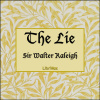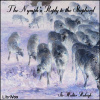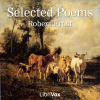Sir Walter Raleigh - Selection of Poems by Sir Walter Raleigh
Sir Walter Raleigh
100%
Speed
Poetry
749
Length
33 minutes
Year
1653
Summary
Sir Walter Raleigh (c. 1552 – 29 October 1618) was an English aristocrat, writer, poet, soldier, courtier, spy, and explorer. He is also well known for popularising tobacco in England.Raleigh's poetry is written in the relatively straightforward, unornamented mode known as the plain style. C. S. Lewis considered Raleigh one of the era's «silver poets», a group of writers who resisted the Italian Renaissance influence of dense classical reference and elaborate poetic devices.
In poems such as «What is Our Life» and «The Lie», Raleigh expresses a contemptus mundi (contempt of the world) attitude more characteristic of the Middle Ages than of the dawning era of humanistic optimism. But, his lesser-known long poem «The Ocean to Cynthia» combines this vein with the more elaborate conceits associated with his contemporaries Edmund Spenser and John Donne, expressing a melancholy sense of history.
A minor poem of Raleigh's captures the atmosphere of the court at the time of Queen Elizabeth I. His response to Christopher Marlowe's «The Passionate Shepherd to His Love» was «The Nymph's Reply to the Shepherd». «The Passionate Shepherd to His Love» was written in 1592, while Raleigh's «The Nymph's Reply to The Shepherd» was written four years later. Both were written in the style of traditional pastoral poetry. They follow the same structure of six four-line stanzas employing a rhyme scheme of AABB. (Introduction by Wikipedia)
Sir Walter Raleigh (c. 1552 – 29 October 1618) was an English aristocrat, writer, poet, soldier, courtier, spy, and explorer. He is also well known for popularising tobacco in England.
Raleigh's poetry is written in the relatively straightforward, unornamented mode known as the plain style. C. S. Lewis considered Raleigh one of the era's «silver poets», a group of writers who resisted the Italian Renaissance influence of dense classical reference and elaborate poetic devices.
In poems such as «What is Our Life» and «The Lie», Raleigh expresses a contemptus mundi (contempt of the world) attitude more characteristic of the Middle Ages than of the dawning era of humanistic optimism. But, his lesser-known long poem «The Ocean to Cynthia» combines this vein with the more elaborate conceits associated with his contemporaries Edmund Spenser and John Donne, expressing a melancholy sense of history.
A minor poem of Raleigh's captures the atmosphere of the court at the time of Queen Elizabeth I. His response to Christopher Marlowe's «The Passionate Shepherd to His Love» was «The Nymph's Reply to the Shepherd». «The Passionate Shepherd to His Love» was written in 1592, while Raleigh's «The Nymph's Reply to The Shepherd» was written four years later. Both were written in the style of traditional pastoral poetry. They follow the same structure of six four-line stanzas employing a rhyme scheme of AABB. (Introduction by Wikipedia)
Poems in this collection:
- Epitaph
The Nymph’s Reply to the Shepherd The Lie
The Passionate Man’s Pilgrimage
Life
A Farewell to False Love
Praised be Diana’s Fair and Harmless Light
Farewell to the Court
To her Love when He had obtained Her
Nature that Washed Her Hands in Milk
A Vision upon this Conceit of the Fairy Queen
On the Cards and Dice
The Silent Lover
As You Came from the Holy Land
The Excuse
A Description of Love
An Epitaph Upon the Right Honorable Sir Philip Sidney, Knight, Lord Governor of Flushing
Another of the Same (the Faerie Queene)
The Ocean to Cynthia (fragment)
A Farewell to the Vanities of the World
More from Sir Walter Raleigh
Authorization
By logging in, you agree to the terms and conditions.
















No comments